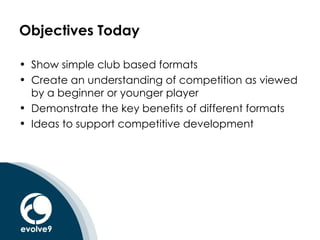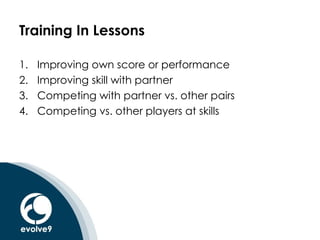Competition Formats
- 1. Competitive Formats Mike Barrell evolve9
- 2. Running programs that are only instructional is like teaching a language that no one will ever use! Ultimately without using this language your skills diminish and you will lose the motivation to continue to develop
- 3. Objectives Today Show simple club based formats Create an understanding of competition as viewed by a beginner or younger player Demonstrate the key benefits of different formats Ideas to support competitive development
- 4. Why Different Formats? Formal formats generally well catered for Growing the game means more players competing Competing is just playing, as long as it is presented properly Coaches and clubs need to present appropriate competition and not just leave it to the associations APPROPRIATE Competition Drives the sport
- 5. Flap Before Flying or it could be fly or die! Getting it Wrong!!
- 6. “ One of my students, a 6-year old, was sure he was going to win the 8 and under. It was cool to see his reaction when he finished 6 matches without a win. He wanted a lesson to get ready for the next tournament.” Butch Staples, Head Professional Midtown Tennis Club, Chicago Getting it Right!!
- 8. Setting Up Use all these in Lessons Courts, Balls, Rackets Tools, Scoreboards and Equipment Teach The rules of tennis. Teaching little ones – in and out Teach scoring – best of 3, 2 serves etc Teach serving order for tiebreak
- 10. Different Orientations Stage 1 - Trying Tennis Stage 2 - One Lesson a Week Stage 3 - My #1 sport Stage 4 - #1 thing in my life
- 11. Competitive Issues FEAR - Controlling external factors FAIR - Get the level right FUN = Not knowing what will happen before it starts A perception of competence (Different for under achiever vs. over achiever) Being with friends
- 12. “ Round Robin? Great More Opportunities to Lose!” Mark aged 8 Getting it Wrong!!
- 13. “ It’s not fair , he was too good!” Jamie aged 7 Getting it Wrong!!
- 14. Over Achiever & Under Achiever Under I Can’t Socially aware Extrinsic Support Needs incremental success Fear of consequences – peers, parents Must be Fair Team start Over I Can May be socially naive Intrinsic challenge Will try anyway until successful May not understand consequences Bring it on Individual
- 15. Progressive Orientation Stage Process Format Establishing 1 Skills festival No competitive measurement Environment 2 Skill Circuits Team based measurable tasks Improve through skills 3 Team based singles Short tiebreak, Best of 3 tie-break Compete with team, short scoring 4 Team based singles & doubles Best of 3 tie-breaks Longer and best of 3 5 Singles and Doubles Short sets to best of 3 sets Longer and set scoring
- 16. Training In Lessons Improving own score or performance Improving skill with partner Competing with partner vs. other pairs Competing vs. other players at skills
- 17. Format Factors Location (moves further) – club provides security and familiarity Team (moving to individual) – tennis is an individual team sport in most competitions Event Duration (gets longer) – investment in time for total event Match Duration (gets longer)– shorter matches mean more starting and stopping Rewarding (relevant to importance) – what to reward Connection (train to play) – lessons need to connect to lessons or else why do either
- 18. Format #1 Team Rallies Task based Teams Short Duration Club Based / Lesson based
- 19. Format #2 Team Cones Quick Matches Team format Club based only Limited stress on individual Who do I get to play next?
- 20. Format #3 Mixed Age Slam Team Format Appropriate Level Longer match duration Could be formal team format Club or interclub Adding Luck
- 21. Reward and Award What do kids want? What messages do we want to send? What deserves a reward? What doesn’t?
- 22. “ Why play? We all know is going to win anyway!” Joe Aged 8 Getting it Wrong!!
- 23. “ When can I play again?” Hannah aged 7 Played 6 lost 5 Getting it Right!!
- 24. Don’t start by skiing the black run! Getting it Wrong!!
- 25. Conclusions Club based competition is vital to the health and growth of tennis Formats must adapt to orientation and lifestyle Players may become more competitive as they gain confidence and competence A pathway / variety of formats provides for all competitive orientations and encourages progression
























